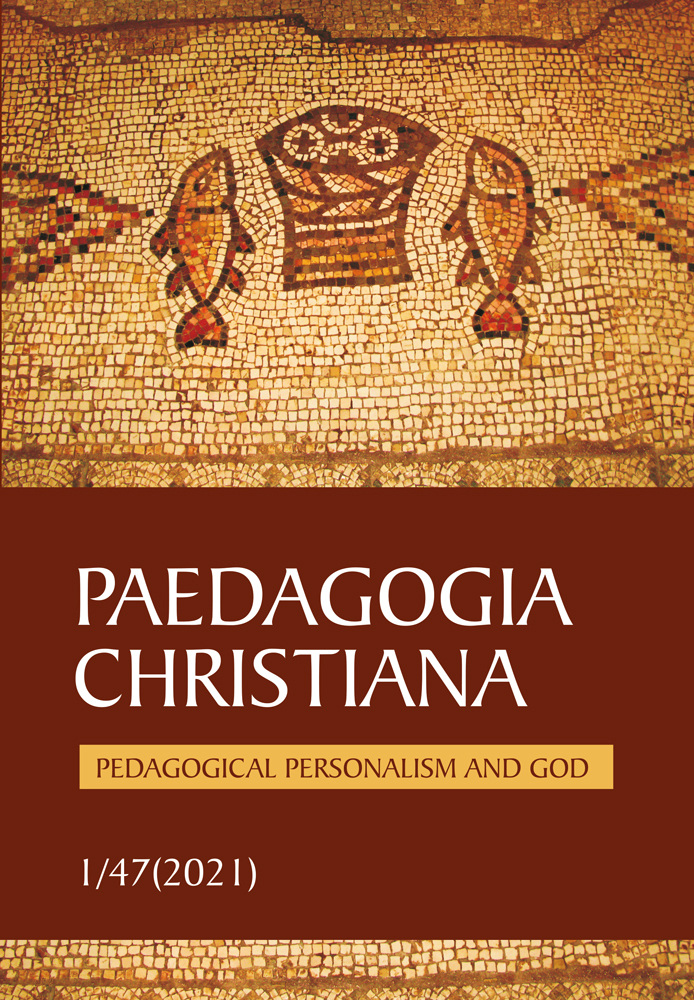Saving Humanity: Despair and Death as Pedagogical Challenges while Caring about Human Existence
DOI:
https://doi.org/10.12775/PCh.2021.009Keywords
existentially valid education, ‘the will of sense’, despair and death as valuable existential experience, ‘working through’ despair to care about quality of life, a person’s concern with protecting their fate, existential insecurityAbstract
The concepts analysed in this paper pertain to despair and death, since these are insufficiently present in pedagogical narrations. Despair and death, which accompany our existential experience throughout our lives, are most frequently treated one-sidedly, pejoratively, and presented as an expression of human evil. The thoughts of Paul Tillich, Viktor Frankl, Vittorino Andreoli and Krystian Lupa open a space for understanding despair and death as existential challenges a person needs to be capable of facing and should treat as valuable experience; an experience which creates an opportunity for a new dimension in our own appreciation of life.
For this reason, an existentially oriented education seems to enable serious thought about a person in the context of their entire life.
References
Andreoli, V. (2009). Zrozumieć cierpienie. Aby ból ustąpił radości [Understand suffering. So pain can give in to joy]. Trans. M. Bielawski. Kraków: Homini.
Bosmans, P. (1991). Być człowiekiem [Be human]. Trans. F. Żołnowski. Warsaw: Wydawnictwo Salezjańskie.
Frankl, V. E. (1971). Homo patiens. Trans. R. Czernecki, J. Morawski. Warsaw: PAX.
Frankl, V. E. (2010). Wola sensu. Założenia and zastosowanie logoterapii [Will to meaning. Foundations and Applications of Logotheraphy]. Trans. A. Wolnicka. Warsaw: Czarna Owca.
Frankl, V. E. (2014). Człowiek w poszukiwaniu sensu [Man’s search for meaning]. Trans. A. Wolnicka. Warsaw: Czarna Owca.
Gonet, K. (2002). Jak by to powiedzieć… Rozmowy z Krystianem Lupą [How to put it… Conversation with Krystian Lupa]. Kraków: Wydawnictwo Krakowskie.
Frąckowiak, T. (2007). O pedagogice nadziei. Fascynacje and asocjacje aksjologiczne [About pedagogy of hope. Axiological fascinations and associations]. Poznań: UAM.
Lupa, K. (1999). Rozmowa. Entretien avec Michel Archimbaud [Conversations. Entretien avec Michel Archimbaud], ed. J. Baillon. Kraków: Centre National du Theatre, Paris, C&D.
Lupa, K. (2003a). Podglądania [Snoopings]. Warsaw: WAB.
Lupa, K. (2003b). Utopia 2. Penetracje [Utopia 2. Penetrations]. Kraków: Wydawnictwo Literackie.
Merton, T. (2005). Piękno pustyni [The Wisdom of the Desert]. Trans. K. Stankiewicz. Kraków: Salwador.
Szczepański, J. (1988). Sprawy ludzkie [Human issues]. Warsaw: Czytelnik.
Tischner, J. (2012). Filozofia dramatu [Philosophy of drama]. Kraków: Znak.
Tischner, J. (2013). O człowieku. Wybór pism filozoficznych [About a man. Selection of philosophical writings], ed. A. Bobko, M. Kozak. Wrocław: Zakład Narodowy im. Ossolińskich.
Tillich, P. (1994). Męstwo bycia [The Courage to Be]. Trans. H. Bednarek. Poznań: Rebis.
Tillich, P. (2004). Teologia systematyczna, t. II [Systematic Theology, Vol. II]. Trans. J. Marzęcki. Kęty: Antyk.
Twardowski, J. (1979). Poezje wybrane [Selected poems]. Warsaw: Ludowa Spółdzielnia Wydawnicza.
Twardowski, J. (1993). Wiersze [Poems]. Białystok: Łyk.
Walczak, P. (2007). Wychowanie jako spotkanie. Józefa Tischnera filozofia człowieka jako źródło inspiracji pedagogicznych [Education as meeting. Józef Tischner’s philosophy of a man as a source of pedagogical inspiration]. Kraków: Impuls.
Downloads
Published
How to Cite
Issue
Section
License

This work is licensed under a Creative Commons Attribution-NoDerivatives 4.0 International License.
Stats
Number of views and downloads: 1080
Number of citations: 0



